Sucralose is an artificial sweetener that helps you cut out sugar from your diet.
While it’s taken a bad rap as a synthetic sweetener, the evidence for any safety concerns is somewhat weak, especially when compared to the well-documented negative health effects of plain sugar.
When it comes to replacing sugar, there are a lot of options out there, but for sucralose specifically, we’ve evaluated and ranked the ten best options on the market, and looked at some of the science behind the benefits and side effects of sucralose. Read on for more.
Research
Rankings
Last updated: April 10, 2023
Sucralose brands considered: 22
Hours of research: 28
Experts reviewed: 5
Scientific papers referenced: 19
1. BulkSupplements Sucralose
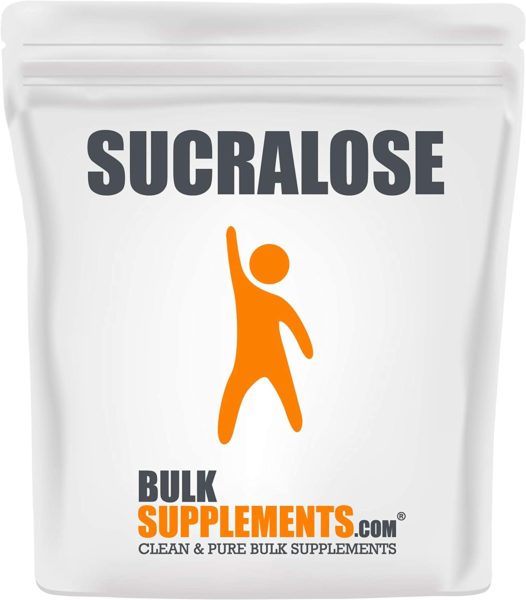
Do you use sugar in everything and can’t figure out how to replace it? BulkSupplements Sucralose is the way to go.
If you’ve been mixing honey, fruit juice, or brown sugar into your smoothies, coffee, or tea, and are just now realizing how much sugar you’ve been ingesting, try this bulk source of sucralose to wean yourself off sugar without giving up your sweet tooth.
2. JD Liquid Sucralose
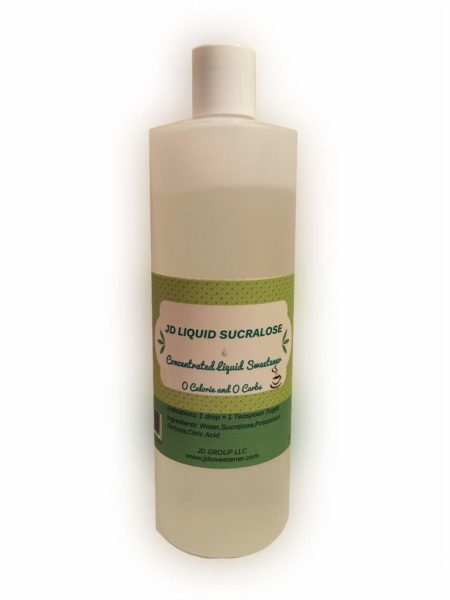
Among the liquid sucralose products, JD Liquid Sucralose is the best if you need a bulk source of liquid sucralose.
It’s great for rapid and efficient blending into smoothies, big batches of iced tea, and coffee.
It’s also free of sodium benzoate, a preservative that’s found in many other competitors. If you just use a few drops per day, this might not be the smartest option, but for bulk users, there aren’t any better options that come in liquid form.
3. Sweet Solutions Sucralose
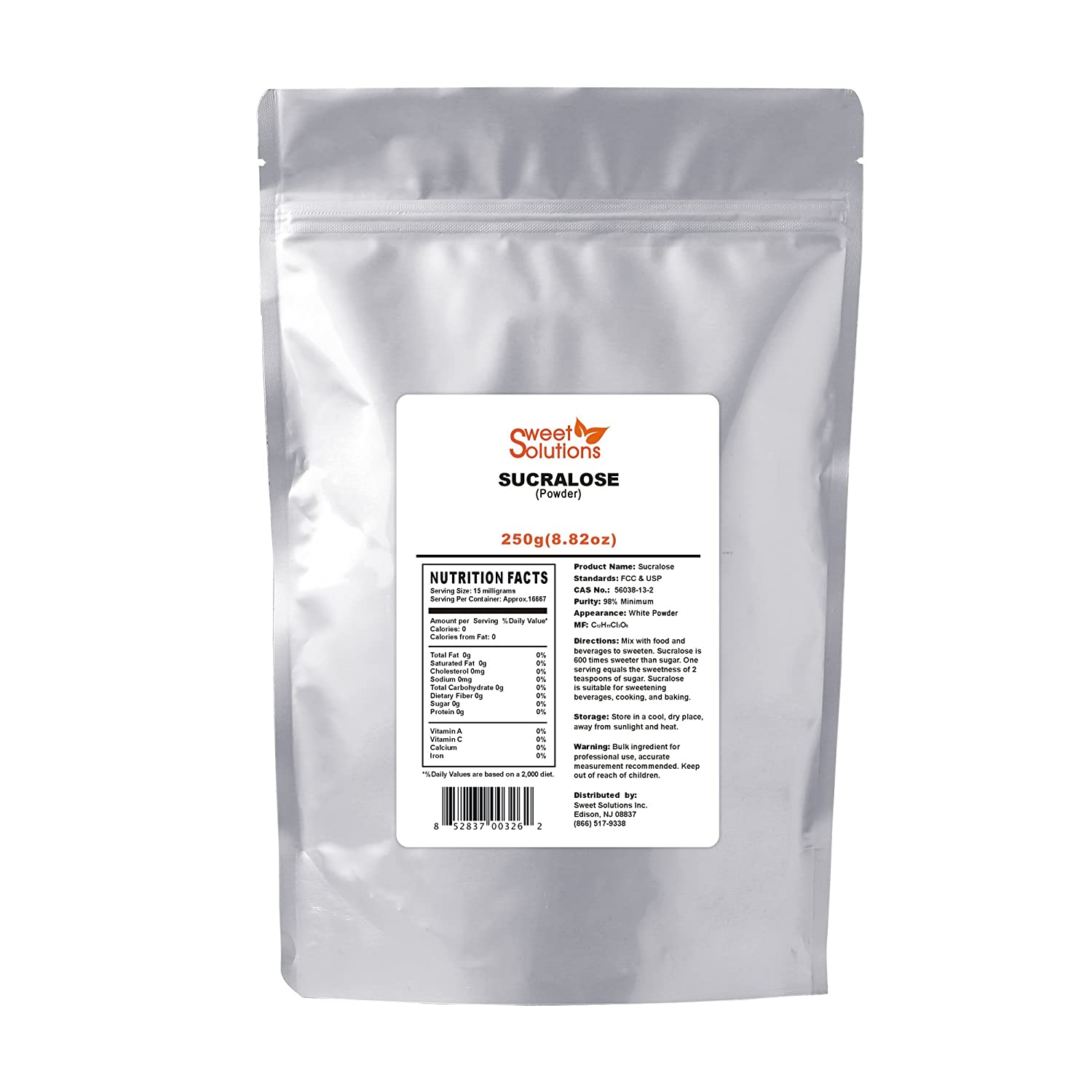
Sweet Solutions Sucralose is a good option if you want powder form sucralose but aren’t a bulk user.
This sweetener comes in a 250 gram resealable bag, so it’s good for occasional use and it still 100% pure and free of any additives. Plus it meets USP purity standards, so you know it’s high-quality.
4. Hard Rhino Sucralose
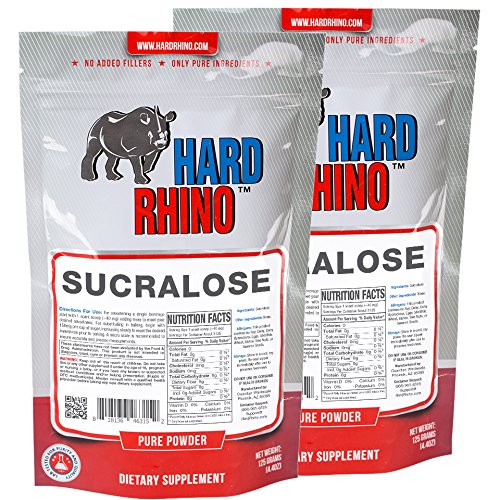
Hard Rhino Sucralose is a pretty solid powder-form sucralose product that comes in a hefty 250 gram bag, with an option of even more in larger sizes. The bag reaseals fairly well and the product is 100% pure, making it a good pick for a bulk option.
5. SucraDrops Liquid Sucralose
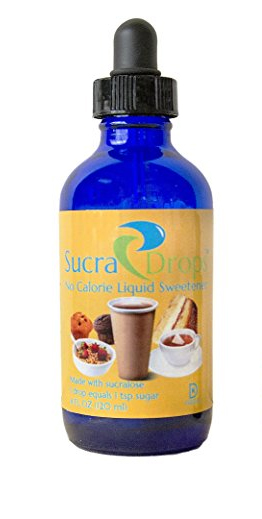
SucraDrops Liquid Sucralose is extremely convenient for adding sweetness to coffee and tea, since it’s already in liquid form.
There is sucralose dissolved in distilled water, along with some preservatives and stabilizers like potassium sorbate and sodium benzoate.
These last few ingredients won’t win over more stringent purists, but then again, there are better options for sugar replacements if you want natural options anyways.
6. Splenda Zero
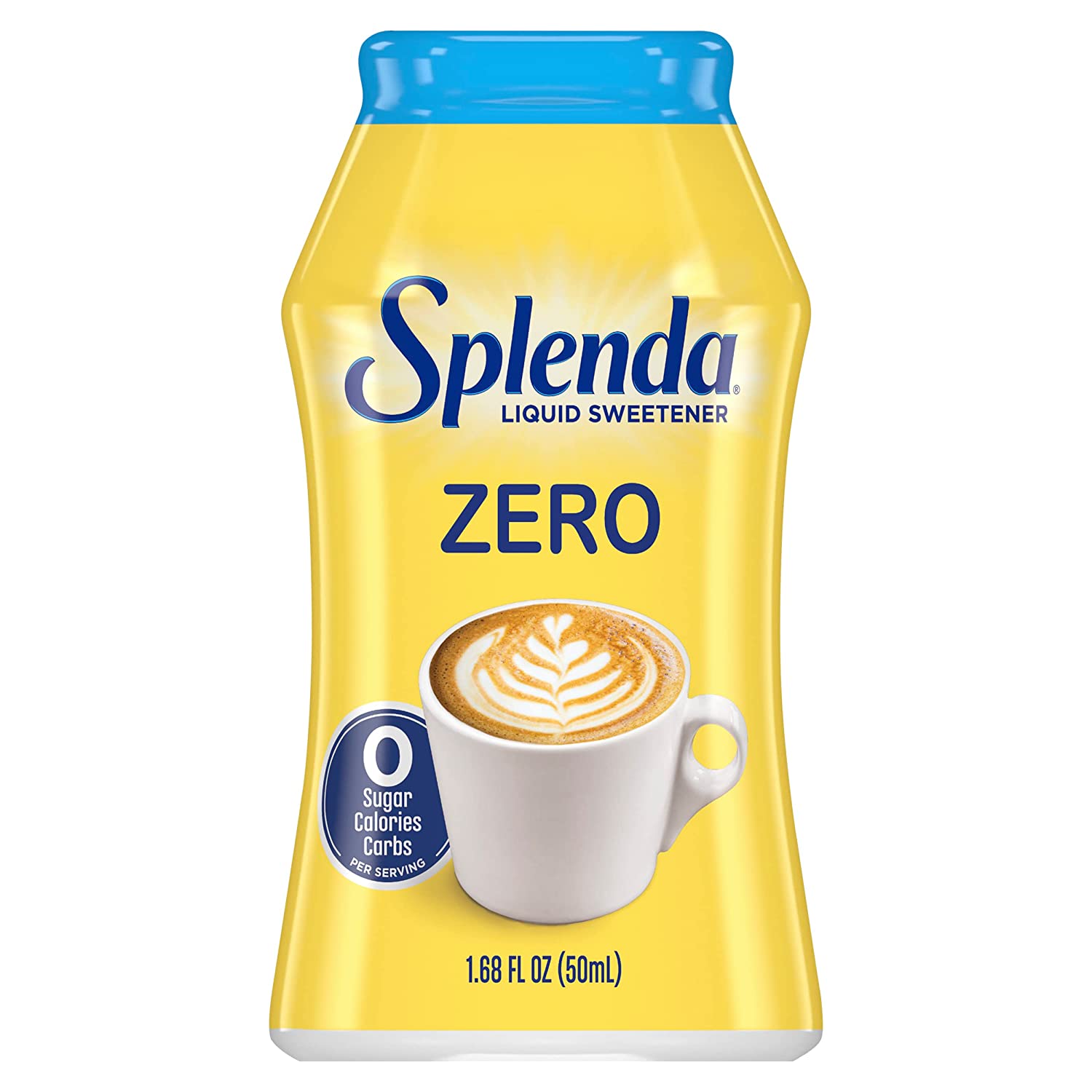
Splenda Zero is a tiny travel-sized bottle of liquid sucralose designed for keto dieters that can’t get by without a little sweetness in their coffee or tea.
The tiny travel size is great, though it’d be better if this sucralose solution didn’t rely on sodium benzoate as a preservative.
7. EZ-Sweetz
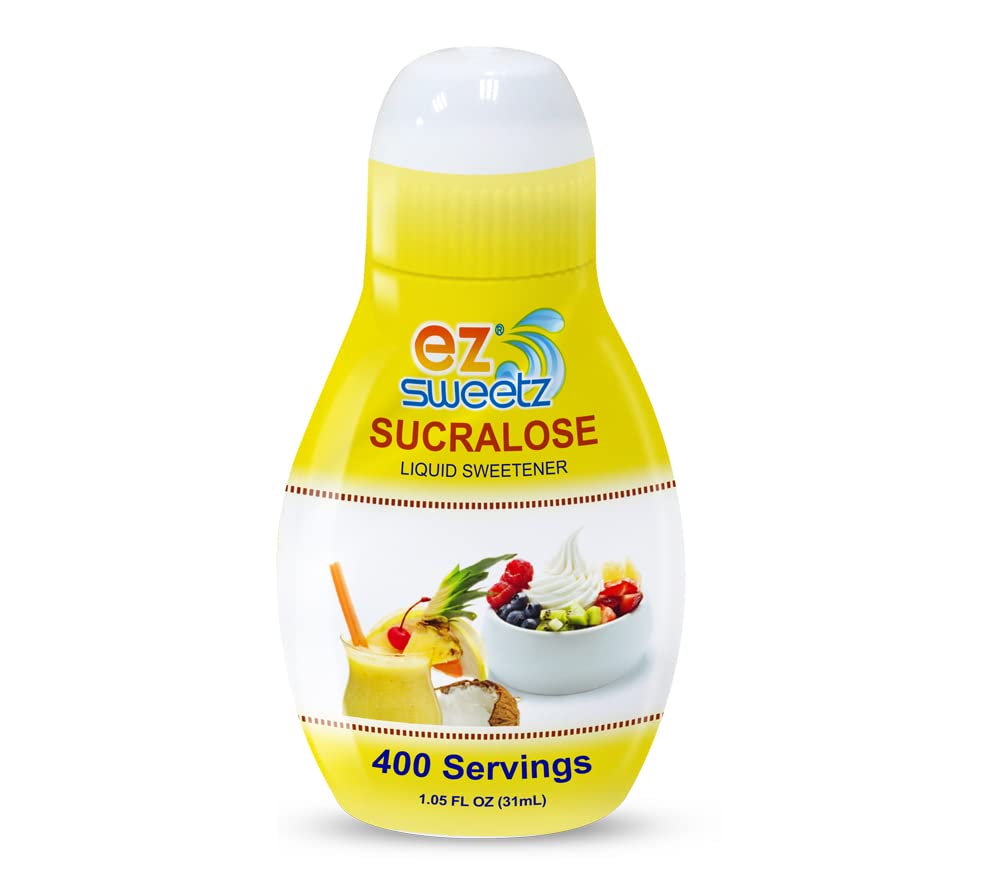
EZ-Sweetz is a liquid sucralose supplement that comes in a discrete pocket-sized container that makes it well-suited for travel.
If you want to be able to add some sweetness to your morning coffee without adding real sugar, EZ-Sweetz is a good choice. Like many other liquid form sucralose sweeteners, it uses preservatives that some people may dislike, such as sodium benzoate.
8. Sweet Solutions Liquid Sucralose
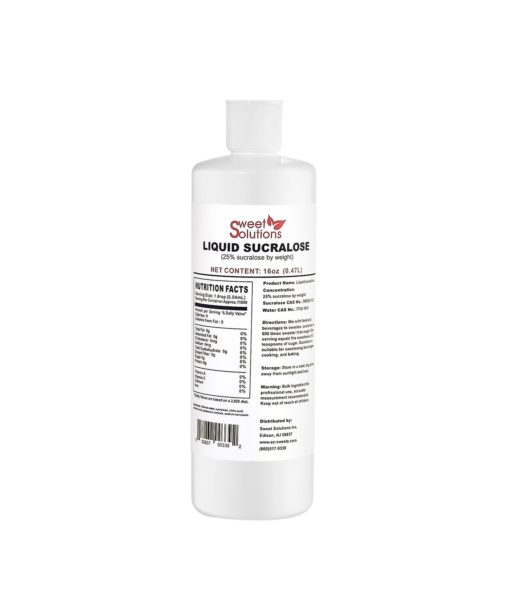
Sweet Solutions Liquid Sucralose is a liquid form sucralose sweetener that comes in a fairly hefty 16 ounce bottle.
If you don’t need the large volume of bulk products, but also don’t want to go through so many of the travel-sized bottles offered by other competitors, it’s a decent pick.
9. Natural Mate Sweetener
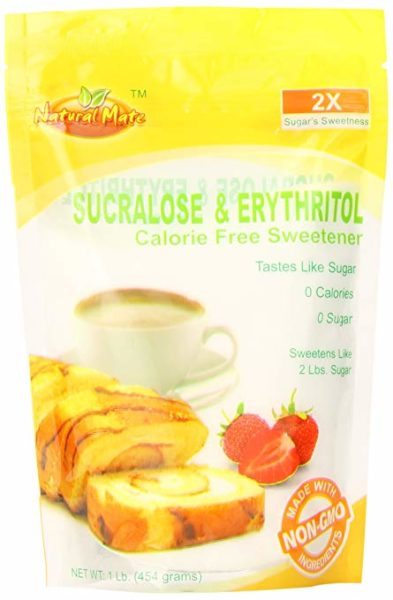
Natural Mate Sweetener is a bit unique in that it uses a blend of sucralose and erythritol. This gives it a sweeter profile, per unit weight, but erythritol does have some disadvantages.
Namely, in larger doses it can cause diarrhea and stomach pain in some people. As such, Natural Mate Sweetener is more apt for use as a coffee and tea sweetener, and not for things like baking.
10. Splenda No Calorie Sweetener
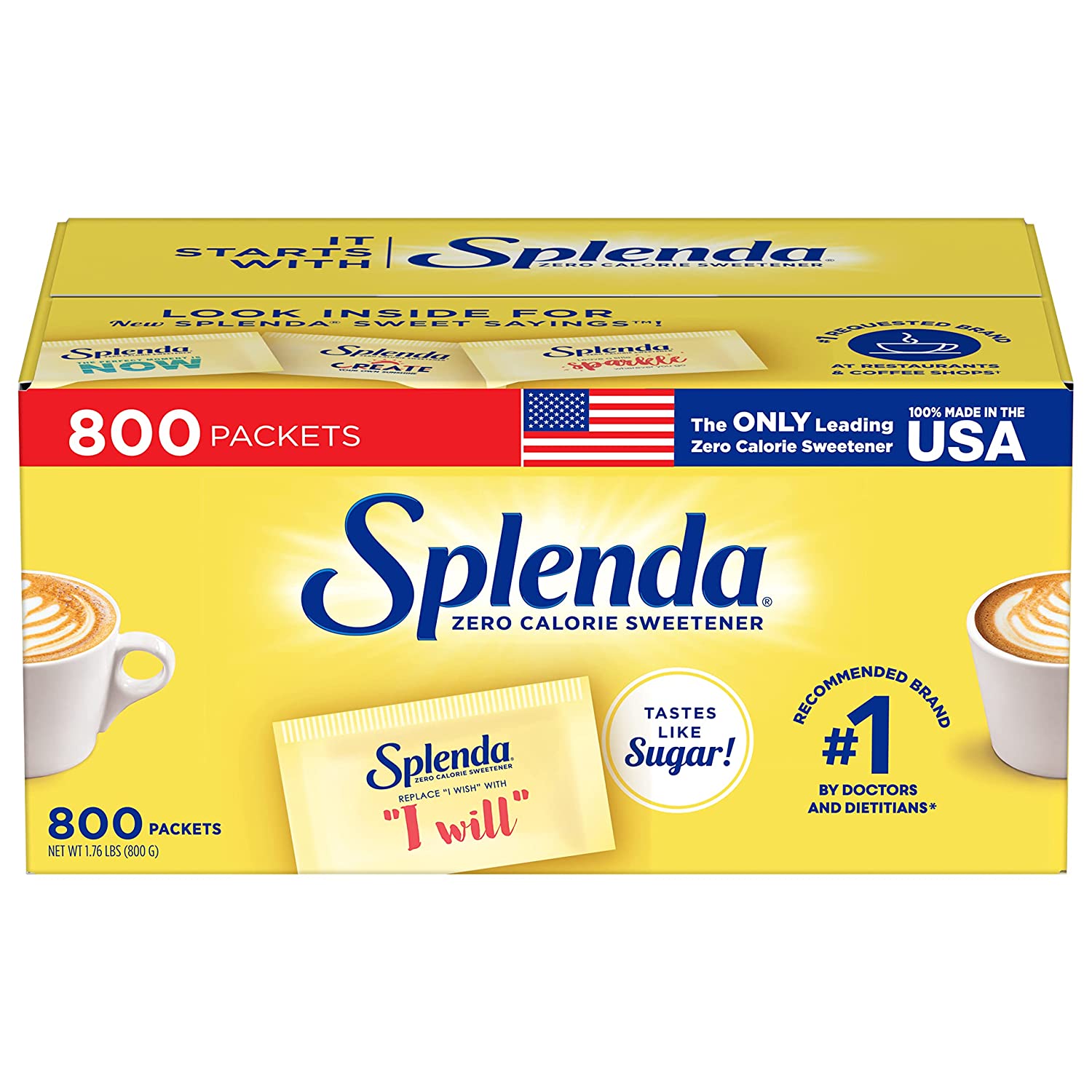
Though Splenda No Calorie Sweetener is the original sucralose brand, it hasn’t quite held up over time.
Splenda isn’t 100% sucralose; it also contains maltodextrin, a starchy powder that adds a small but notable amount of carbohydrates to Splenda. For most people, there are better options than Splenda unless the taste is particularly appealing.
Category winners
Best sucralose overall: BulkSupplements Sucralose
BulkSupplements shines when it comes to producing powder form supplements of impeccable purity. For something like sucralose, that’s precisely what you want—you can’t beat BulkSupplements Sucralose when it comes to all-purpose calorie-free sweetening.
Best sucralose for FODMAP-free diet: Sweet Solutions Sucralose
Unlike sweeteners such as fructose and sugar alcohols, sucralose does not tend to ferment in the colon and cause gastrointestinal distress. If all you need is the occasional source of sweetness in a FODMAP-free diet, Sweet Solutions Sucralose is the perfect choice.
Best sucralose for keto diet: Hard Rhino Sucralose
Trying to keep your carb intake as low as possible? Hard Rhino has zero additives and comes in bulk-sized resealable bags, so it’s great for adding flavor to keto shakes, keto coffee, and other ketogenic diet-friendly foods and beverages.
Best sucralose for diabetics: Sweet Solutions Sucralose
Sucralose is great for diabetics, as it doesn’t affect the body’s insulin or blood glucose levels. Sweet Solutions Sucralose is our favorite for adding some sweetness to a diabetic-friendly diet without adding any sugar, thanks to its excellent purity.
Best sucralose for baking: BulkSupplements Sucralose
BulkSupplements Sucralose can replace sugar one-to-one in baking recipes, and handles the heat of the oven just fine. It’s the ideal choice for sugar-free baking.
Best liquid sucralose: JD Liquid Sucralose
Using sucralose to sweeten tea, coffee, or other beverages is a lot easier if it’s already in liquid form. JD Liquid Sucralose is your best option for liquid sucralose—it’s easy to mix into solutions and it’s free of benzoate-based preservatives.
Who should buy sucralose?
Sucralose is a good option for a non-caloric sweetener. If you regularly put sugar in your coffee, in your tea, or on your baked goods, you are not doing your body any favors. Here are a few groups of people who should strongly consider swapping out sugar with sucralose.
People who are at risk for type 2 diabetes. Even small amounts of sugar can negatively impact your body’s metabolic health, and a high consumption of sugar has been connected to weight gain, type two diabetes, and heart disease, to name just a few chronic health conditions.
Using sucralose instead of sugar can lessen the blow to your body’s metabolic system.
People who want to eat healthier but have a sweet tooth. If you have a sweet tooth and a sugar habit that’s hard to kick, sucralose can be a good way to satiate your desire for sweetness while avoiding the empty calories and unhealthy metabolic effects of sucrose (i.e. normal table sugar).
Along with other natural and artificial sweeteners, such as erythritol and stevia, sucralose provides the same sweet taste as real sugar, but provides zero calories.
People who usually add a lot of sugar to their tea or coffee. Though many people snub their nose at non caloric sweeteners, adding sucralose to your favorite drink is a lot better for you than adding sugar. Sugar causes weight gain and metabolic dysfunction; sucralose does neither of these things.
How we ranked
Our rankings of the top sucralose products on the market were informed by both purity and ease of use. Here are the criteria we used to rank.
Both liquid and powder sucralose have good use cases, so we included both. We gathered lists of liquid based and powder based sucralose supplements and picked the best from each category.
Liquid sucralose: easy dosing and no additives. For liquid sucralose supplements, we checked to see whether the liquid contained undesirable preservatives or stabilizers, and we also rated the container on how easy it was to dispense a measured amount of sucralose.
Nothing is worse than trying to put one or two drops of sucralose into your coffee, but ending up with much more than that because of a poorly designed bottle. We also made sure we included bulk-sized sucralose liquids for easily making coffee or tea at home, plus travel-sized dropper bottles for sweetening drinks on the go.
For powdered sucralose, purity and packaging quality mattered most. For powder-based sucralose supplements, we looked at the purity (was it 100% sucralose?) and the quality of the packaging. Poorly designed foil bags can be difficult or impossible to reseal correctly, which makes it far too easy to make a mess, and for air and moisture to get into your sucralose after opening.
This can leave your sucralose powder clumpy and difficult to use. So, we chose products that were both pure and packaged in a high-quality bag.
Powder-based products came out on top, because of their purity and versatility. Finally, we pooled the two categories and sorted the best products according to quality. Powder-based sucralose products had a slight edge, simply because they can be 100% pure and are far more flexible (e.g. for baking).
Regardless, whether you want a powder based or liquid based sucralose product, you’ll find the best ones in our rankings.
FAQ
Q: What is sucralose?
A: Sucralose is a molecule that is structurally very similar to sugar, and as a result, generates a very similar taste and sensation of sweetness that real sugar (sucrose) would generate.
However, because of the structural differences in the molecule, sucralose cannot be broken down by your body. This is beneficial, because it means that you derive no calories from sucralose.
On top of that, you don’t get any of the negative metabolic effects from sucralose that you get from sugar, like disruptions in metabolic homeostasis and (over time) the development of insulin resistance and eventually metabolic disease. Sucralose is a popular substitute for sugar for all of these reasons, among populations ranging from type two diabetics to people on ketogenic diets.
Q: How many calories does sucralose have?
A: Sucralose has zero calories, because your body cannot effectively break it down to extract energy. This is in contrast to other sugar substitutes such as erythritol, which has far fewer calories than regular sugar, but still contains some calories. The complete lack of calories in sucralose is one of its primary advantages as an artificial sweetener.
Q: Is sucralose keto friendly?
A: Yes, sucralose is keto friendly and is compatible with a ketogenic diet because it does not contain any calories, and thus cannot push your body out of ketosis.
However, it is somewhat unpopular among some keto diet enthusiasts because sucralose is definitely not a natural food. It will not, however, disrupt a state of ketosis like sugar will, so if you are having a hard time kicking a sugar habit or a sweet tooth while on a keto diet, sucralose can be extremely handy.
Q: Is sucralose good for diabetics?
A: Sucralose is very popular among diabetics because it is very sweet and contains zero calories. This means that it will not negatively influence your blood sugar and insulin levels the way that table sugar will.
Moreover, in the long term, sucralose could help you avoid metabolic disease by preventing the kind of insulin resistance that you would develop if you consumed a lot of sugar on a regular basis.
There are some concerns that sucralose and other non caloric sweeteners may still stimulate some of the reward circuits linked to sugar consumption, which might indirectly affect your sugar consumption, but this biochemical issue is far from resolved right now. What we do know is that sucralose itself does not affect your blood sugar.
Q: Is stevia better than sucralose?
A: Many people like stevia as a non-caloric sweetener because it is all-natural and is derived directly from a plant. Other natural non-caloric sweeteners like monk fruit extract also fall into this category.
People do get turned off by synthetic or artificial sweeteners, but in the case of sucralose, there isn’t a very strong case against it aside from the fact that it’s synthetic instead of natural.
Stevia is better in the sense of offering additional benefits, such as the possibility to lower blood pressure and reduce cholesterol levels, but in terms of the short-term effects on your body, both stevia and sucralose taste sweet and don’t contain the calories and the negative metabolic effects that you’d get with table sugar.
Related articles
Recap
Sucralose is a good all-around non-caloric sweetener for replacing sugar in your diet. It’s been associated with positive benefits for weight loss, decreasing fat mass, and decreasing waist circumference.
There are some theoretical concerns with using sucralose in high-heat situations (baking at high temperatures), so avoiding sucralose for baking when the oven is hotter than 350 degrees F seems like a good precaution. keep in mind there are other low-calorie alternative sweeteners that are heat stable.
There is no clear evidence indicating that the use of sucralose is harmful, and if you enjoy the taste and feel confident consuming it, it may be a good strategy for reducing overall calorie intake.
For BodyNutrition‘s #1 sucralose recommendation, click here.